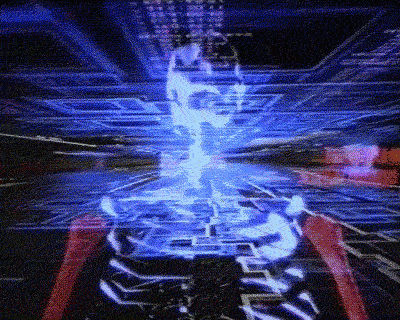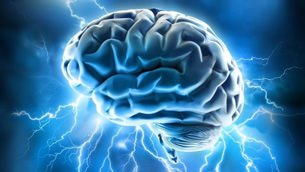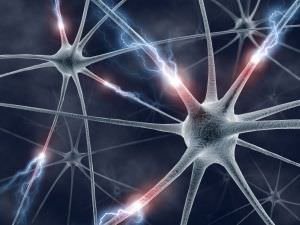Brain Implants for Memory and Intelligence
Science fiction has a history of envisioning cybernetic technology. From Johnny Mnemonic, to Ghost in the Shell and The Matrix to name a few, the cyberpunk fantasy has captivated our vision for positive and negative technological development. Fantasy is fast advancing towards a mainstream technological reality.

Source
Merging technology with the brain is already being done with brain-computer interfaces brain–computer interfaces (BCI), neural-control interfaces (NCI), mind-machine interfaces (MMI), direct neural interfaces (DNI), or brain–machine interfaces (BMI) to act as a prosthetic for impaired senses or disabilities. The reality might be that we're already closer to the future than we think. Donald Marshall has talked about his story of brain chip implants used to download consciousness and take over the bodies of others. That's a frightening reality to live in, if it's true. Maybe that exists, maybe not, but we are headed in that direction it seems.

Source
Sensory augmentation isn't the only thing being worked on. Brain implants are being developed to enhance memory, and thereby affect intelligence capacities.
Memory Recall
A new deep brain stimulation device can listen to the brain and improve one's ability to recall a list of words by 15%. This is promising for those who have neurological conditions like Alzheimer's disease that slowly degenerate their cognitive functions.
The device is fine tuned to activate memory network components in the brain when it struggles to store memories. Electrical stimulation has been used before to improve memory, but targeting specific pathways is how this device works. Other precision devices were also made, but were an open loop system and didn't get feedback from the brain to tweak the stimulation. The new device is close loop and varies electrical stimulation based on feedback from the lateral temporal cortex. It works like a pacemaker, listening to what's going on before acting to stimulate memory enhancement.
Neuromodulation algorithms can be further developed to apply different changes to the brain. Neuromodulation is when nerve activity is altered by stimulating specific neurological sites. This can be done with chemicals like pharmaceuticals, electrical or other energy stimulation. It's already been used to relive pain and restore functionality to bowel and bladder control as well as tremor control suffered by Parkinson's disease and other ailments.
New Age of Enhanced Brain Power
Kernel is a recent startup created by Bryan Johnson, and funded with $100 million of his own money. His stated goal is to contribute to the progress of humanity through enhancing intelligence, with the aim of dramatically increasing our quality of life.
In the last century, we greatly expanded the notion of what it means to be human. Remarkable innovations in both science and technology brought us to the moon, laid the foundation of the Internet, and cured many of the most pressing diseases that plagued us for eons.
What’s next?
To further explore our own human boundaries, a wave of new technologies needs to emerge that can access, read, and write from the most powerful tool we have—the human brain.
There has been early testing to show the technology works in rats. Recording the electrical frequencies in one rat allowed a memory to be transfered to another rat. The device was also used in monkeys to improve difficult memory recall tasks.
For human potential, Kernel is working with the University of Southern California in Los Angeles to study the brain activity from epilepsy implants to understand more about how our memory functions. Learning how to mirror and mimic memory is also required for further technological progress into AI development. We don't yet understand how our own consciousness is created. Until such a time, it's less likely we will spontaneously create a real artificial consciousness that compares to our own.
This technology would first be developed to aid those with memory issues, like: not being able to form lasting memories, sufferers of concussions, strokes, Alzheimer's, dementia, and traumatic brain injury. Patients who have had electrical stimulation in the hippocampus have shown that this process is effective at enhancing memorization abilities. All of this stimulation is currently done while connected to a computer.
The ideal device will be smaller, and will monitor and stimulate multiple neurons in the hippocampus. It will store data, interface with external devices for control and monitoring, and process data to enhance brain power. Potential applications for the technology are:
- VR time dilation
- faster learning
- faster recall
- memory optimization through selective deletion
- computer interfacing
- downloading memories
The Matrix - "I Know Kung Fu"
Mind Control
All of this might sound great, but is has potential for abuse as well. We have to be weary how much we entrust control of ourselves to others. The appeal to "enhance" is quite an allure that can cost us gravely. All because we aren't content being who we are as biological beings. Desiring to be more than biological, and become technological beings, are dangerous grounds to pursue.
Enhanced learning can become enhanced dumbing down. Memory deletion can be used to control what we understand and how we view the world. If anyone has watched Stargate SG-1, there is an episode where the inhabitants are being protected from a toxic atmosphere by a dome. They have instant recall of any information, as they are all linked to a network with a device that feeds them the data. But they are being slowly killed off by an AI program that is deleting their memories of the size of their dome-protected village and who lives there. As the dome shrinks due to diminishing power, people who are outside the new dome are left to die, without being remembered to have ever existed.
Computer interfacing, like in the cyberpunk series Ghost in the Shell, can also lead to complete control of your body, and even brain-death. We could even have whole identities replace who we are. As this tech becomes more trendy, the privacy concerns that will arise will also fade and the dangers will become but a memory for most. A trap might be set at this point.
I see a lot of potential for greater control of humanity through this tech, if not directly, then indirectly through more bread and circus manipulation of our senses and affinity for pleasure and stimulus. We like to be entertained after all. Living in a virtual reality, losing ourselves there, wasting time and energy in a false reality... woops... am I talking about the future or the current era of gaming and "augmented reality"?
While some see great visions for the future, others are more skeptical and doubtful much of this will work. Determining which bit of code represents a certain memory capacity, and then modifying to enhance or create memory might be tougher than envisioned. The simpler control of activating neurons to stimulate memories has worked (like in mice), and might indicate the next approach they take if the current enhancement fails. This could sure be handy for some nefarious people who want to literally control the brains and minds of people.
One thing seems clear, this new niche for the future, of bio-tech, cybertech, and AI's, might be one of the largest industries to ever emerge. Synthetic life along with AIs is also part of the vision many people have for our future. I'm not too sure if it's all good though. Humanity is dabbling with exciting technology but is also walking on dangerous grounds. Biological humanity might die away in the end...

Source
References:
http://spectrum.ieee.org/the-human-os/biomedical/bionics/new-startup-aims-to-commercialize-a-brain-prosthetic-to-improve-memory
https://www.inverse.com/article/19812-kernel-neural-implant-prosthesis-singularity-artificial-intelligence
https://www.newscientist.com/article/2109868-100-million-project-to-make-intelligence-boosting-brain-implant/
http://www.marketwatch.com/story/brain-implants-would-make-the-matrix-come-to-life-2016-08-26
https://www.washingtonpost.com/news/the-switch/wp/2016/08/15/putting-a-computer-in-your-brain-is-no-longer-science-fiction/
https://www.newscientist.com/article/dn26113-swap-bad-memories-for-good-at-the-flick-of-a-switch/
http://kernel.co/
https://www.ncbi.nlm.nih.gov/pmc/articles/PMC3872745/
https://www.ncbi.nlm.nih.gov/pmc/articles/PMC3919468/
https://www.nature.com/articles/s41467-017-02753-0
https://www.sciencealert.com/closed-loop-deep-brain-stimulation-improves-memorisation
http://www.neuromodulation.com/neuromodulation-defined
Thank you for your time and attention. Peace.
If you appreciate and value the content, please consider: Upvoting, Sharing or Reblogging below.
 me for more content to come!
me for more content to come!
My goal is to share knowledge, truth and moral understanding in order to help change the world for the better. If you appreciate and value what I do, please consider supporting me as a Steem Witness by voting for me at the bottom of the Witness page.





If Elons neuralink is commercialized in such a away that the 'o' of the i/o can be broadcast at the same speed that the input can receive information, then whatever external third party machinery that is used to interface with this technology would have to be trusted.
Ultimately, it can not be trusted. People will have to make a hard decision to miss out on the awesomeness of the new technology or submit to having your brain's data harvested at the speed of thought with each and every use of the device.
Peering into the future as I imagine it, Musk is creating a device to not only access the internet of the mind, but also interface with it. He's just creating the Ethernet port. Meaning, whoever creates the machine's that will connect to it wirelessly will have access to your brain's data.
They will take the cancerous app model that was first introduced in cell phones, that ended up spreading to windows and metastasizing in the human psyche, and use something like that to communicate with the neuralink.
Each time you install a new application like 'Learn Spanish in 2 minutes', You'll have to let that device read your brain while you watch a trailer, or solve a mini game puzzle or something to that effect, while they harvest your thoughts on the matter.
People will want all these free apps, there will be a price. Even the paid apps will require something extra from you. By then people will be so conditioned to simply blindly agree to everything, that they won't give it a second thought.
That seems like a highly probable future outcome...scary :/
Totally agree with you, we're walking in a path that, maybe, lead us to our biological end. But, does it mean we are going to lose out humanity as well? or can we survive as in a symbiosis? with the best of both worlds?
I think, we are living the beginning of all of these, but we wont see the end, maybe our grandchildren. Maybe, for them, being half machine and half human will be the most normal thing in their life.
I'm "pro - enhancement" but , I wont if it cost my humanity. I have to remain "me" , if not, what's the point?
Would you accept any kind of enhancement in your body?
It it's not broken, there is nothing to fix or need to enhance.
Well, I didn't say it, but yes, it's in case you need an enhancement. For example, a knee or heart, I don't know, But I meant in case you need. Otherwise, no. If a person is 100% , there's no need for enhancement, no need to risk anything.
Anyway, it's a very interesting theme and on the top of our mind in these days.
know that this is a technological advance and will help many people suffering from Alzheimer's recover 15% of their brain capacity, in my case I would not use it, maybe it would be because I do not adapt to the new technological advance.
@krnel If you had the chance to get a memory implant, would you risk it?
Heck no... I value being a real human, not some altered technological version. Maybe if my mind gets sick like Alzheimer's, that's justifiable...but otherwise no
ser 100% humano es lo mejor.
My Gawd! This is mind-blogging! I can imagine what could be achieved with this technology. I even foresee a future where school children won't need to read books as chips could be implanted in their heads that will induce intelligence. But, like you opined, there could be devastating effects.
That was a nice read!
Inducing intelligence isn't real intelligence, it's dependence on technology to do it for you, not you doing it at all. It's a devolution of humanity.
Props for referencing Jonny Mnemonic. I used to relly like that movie as a kid but it didn't seem to hold up when I tried to watch it a few years ago lol.
I pretty much agree with you here. I think these types things would be great in medical applications but I wouldn't want google having direct access to whats going on in my brain just so I could remember a little better lol.
LOL, indeed ;) If you have something taken form you, fine, but not to increase and cheat your way to more ;)
The downside potential here is reminiscent of servitors from the Warhammer 40k universe. Servitors are basically people who, as a form of punishment, are tasked as a kind of biological-computer hybrid. Their minds are wiped of all personality and memory aside from that necessary to perform a select suite of actions, which focuses the entire processing power of the brain to routine tasks via chips and brain surgery.
Great information, thanks for posting.
Damn, freaky game character...
Sign me up for cyborg augments. Team Skynet. Are you guys watching the new season of Westworld? What about The Expanse or Altered Carbon? Lot's of good Sci-Fi out there these days.
no implants for me thank you.
xD
ill live on the savage reservation over the brave new world if i have a chance.
lol
Here are your recent posts:
Brought to you by Recent post widget by @techstack
The future has so much potential for good but it is quite scary also, what if we are hacked? Not only must we look out for viruses but also melware.
Scary stuff.